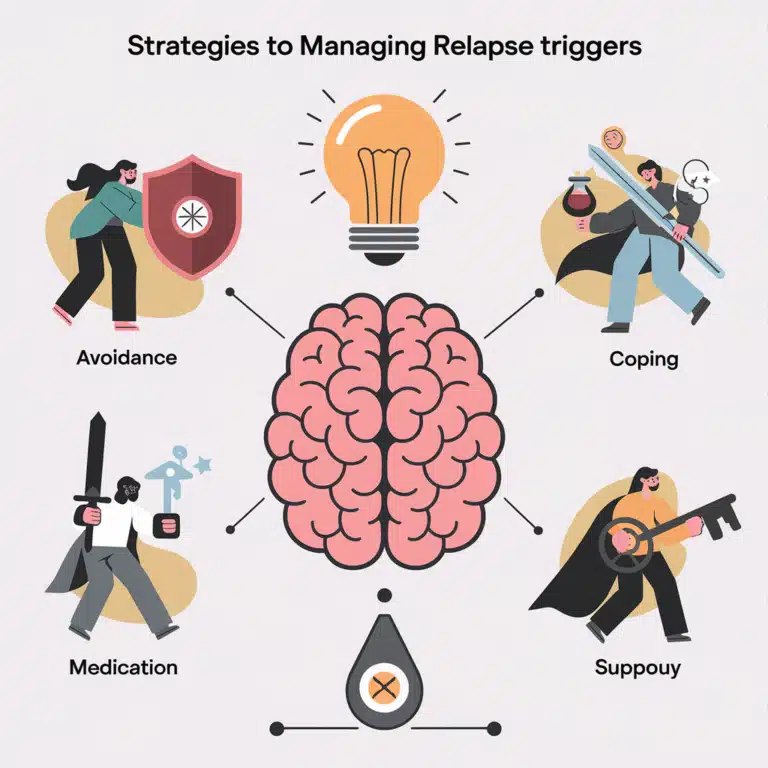A trigger is a psychological tickle that makes our brain excited. Our brain remembers the good feeling from a bad habit (or an addictive behavior). (Here, when I say “remembers,” I’m talking about the hippocampus, a part of your brain’s limbic system responsible for memory.)
What’s intriguing is that triggers make us feel a rush before the bad habit even starts. Sometimes, as Stephanie Watson, a Former Executive Editor of Harvard Women’s Health Magazine, said, just thinking about it feels better than doing it. A trigger is thus a powerful reminder of the pleasure we had before.
Relapse is pretty simple. It’s going back to a bad habit. Sometimes, it happens for no reason or because something makes us feel bad.
And you know what? Being sad, tired, lonely, or hungry can lead us to a relapse. Any problem in our life can push us back.
The key is knowing how to manage relapse triggers and fighting them to sidestep addiction.
Let’s learn how to help people avoid these problems. We can teach them how to turn these challenging times into steps toward recovery.
What You Need to Know About Managing Relapse Triggers
Relapse triggers are the annoying visitors who won’t leave. They often come from feeling upset, places, being around certain people, or even everyday habits.
The first step to stop them is to help people notice these things. People who know a lot about overcoming bad habits need to work closely with the people they’re helping to understand these triggers and find ways to deal with them.
A study published in the Eurasian Journal of Medicine notes that “the prevention of relapses requires knowledge of the factors that trigger them and maintaining the remission process.”
That’s why it’s essential to determine what causes these slip-ups and make effective strategies to stop them.
Effective Strategies for Helping Clients Manage Relapse Triggers
Handling relapse triggers is critical to staying sober. Here are some ways experts help clients make lasting changes.
1. Develop a Support Circle
Tell clients to find a support circle. This means friends, family, groups, and helpers.
Research also shows that having support really helps people stay sober and less stressed.
Having people helps when times are hard and keeps clients on track. They can share problems and good times, helping them stay strong in recovery.
2. Learn to Deal with Cravings
Give clients tools to deal with wanting alcohol and feeling upset. Mindfulness, breathing deeply, and writing things down can help clients not use substances.
A review of empirical studies in the Journal of Clinical Psychology shows mindfulness makes it less likely to return to substances by helping clients better understand their feelings.
A better use of these tools often can help clients react better to stress and cravings.
3. Set Clear Limits
Clients need to know where to draw the line to avoid triggers. They should stay away from people, places, and things that make them want to use substances.
Research shows that having clear boundaries helps people control their environment and choices, lowering the risk of going back to using substances.
Teaching clients to know their triggers and set limits helps them keep a safe space for recovery.
4. Know and Understand Triggers
Clients should write down their thoughts, feelings, and situations that make them crave substances. Knowing what triggers them helps them find ways to deal with it.
A study shows that knowing yourself helps see patterns that could lead to the use of substances again.
Knowing their triggers prepares clients to handle them better.
5. Manage Stress Well
Stress often leads back to using substances. Show clients how to manage stress by exercising, doing yoga, or having hobbies.
Being active helps lower anxiety and depression, which has been proven to reduce the risk of going back to substances.
Having ways to relieve stress makes clients stronger against triggers.
6. Have Healthy Daily Habits
Encourage clients to have a daily routine with good habits like eating regularly, exercising, and sleeping enough. A stable routine gives structure and makes it less likely to face triggers.
Research in the American Journal of Lifestyle Medicine shows routines improve mental health and help keep clients sober.
A structured routine gives clients a strong foundation for recovery and makes them feel in control.
7. Make a Personal Plan
Help clients make a personal plan to avoid going back to using substances. This plan should list triggers, coping methods, and who to call in an emergency.
A study in Addiction Behavior found having a plan greatly reduces the chance of relapse by preparing for challenges.
It shows that clients can handle challenging situations better when planning for triggers.
Let’s Turn Triggers into Triumphs
Addiction experts must know and manage relapse triggers well. It helps clients recover better.
We increase the chances of lasting sobriety by fostering a robust support network, teaching helpful coping strategies, setting clear limits, and developing personalized plans.
All these steps are vital to help someone recover. At Haven House, we provide a nurturing environment where our addiction experts can integrate these seven plans into everyday living.
Let’s work together on managing relapse triggers, seeing them as chances to get stronger, and moving forward with hope and effort.

